- Home
- Don DeLillo
End Zone Page 9
End Zone Read online
Page 9
“Right,” I said. “Right, right, right.”
“Awright. Aw-right, Gary boy.”
“Right, right, right.”
“Awright, aw-right.”
“Get it up, get it in.”
“Work, work, work.”
“Awright.”
“Awright. Aw-riiiight.”
I walked slowly around the room, swinging my arms over my head. Some of the players were sitting or lying on the floor. I saw Jerry Fallon and approached him. He was standing against a wall, fists clenched at his sides, his helmet on the floor between his feet.
“Awright, Jerry boy.”
“Awright, Gary.”
“We move them out.”
“Huh huh huh.”
“How to go, big Jerry.”
“Huh huh huh.”
“Awright, awright, awright.”
“We hit, we hit.”
“Jerry boy, big Jerry.”
Somebody called for quiet. I turned and saw Emmett Creed standing in front of a blackboard at the head of the room. His arms were crossed over his chest and he held his baseball cap in his right hand. It took only a few seconds before the room was absolutely still. The cap dangled from his fingers.
“I want the maximal effort,” he said.
Then we were going down the runway, the sounds louder now, many new noises, some grunts and barks, everyone with his private noise, hard fast rhythmic sounds. We came out of the mouth of the tunnel and I saw the faces looking down from both sides, the true, real and honest faces, Americans on a Saturday night, even the more well-to-do among them bearing the look of sharecroppers, a vestigial line of poverty wearing thin but still present on every face, the teen-agers looking like prewar kids, 1940, poorly cut short hair and a belligerent cleanliness. After the introductions I butted pads with Bobby Hopper and then bounced up and down on the sideline as we won the coin toss. The captains returned and we all gathered together around Creed, all of us making noises, a few prayers said, some obscenities exchanged, men jumping, men slapping each other’s helmets. Creed said something into all the noise and then the kick-return team moved onto the field. I glanced across at Centrex. They looked big and happy. They were wearing red jerseys with silver pants and silver helmets. We wore white jerseys with green pants and green and white helmets. My stomach was tight; it seemed to be up near my chest somewhere. I was having trouble breathing and an awful sound was filling my helmet, a sound that seemed to be coming from inside my head. I could see people getting up all over the stadium and the cheerleaders jumping and a couple of stadium cops standing near an exit. I could see the band playing, the movements of the band members as they played, but I couldn’t hear the music. I looked down to my right. Bobby Iselin and Taft Robinson were the deep men. Speed and superspeed. About sixty-eight yards up-held the kicker raised his right arm, gave a little hop, and began to move toward the ball.
Part Two
19
THE SPECIAL TEAMS collided, swarm and thud of interchangeable bodies, small wars commencing here and there, exaltation and firstblood, a helmet bouncing brightly on the splendid grass, the breathless impact of two destructive masses, quite pretty to watch.
*
(The spectator, at this point, is certain to wonder whether he must now endure a football game in print — the author’s way of adding his own neat quarter-notch to the scarred bluesteel of combat writing. The game, after all, is known for its assault-technology motif, and numerous commentators have been willing to risk death by analogy in their public discussions of the resemblance between football and war. But this sort of thing is of little interest to the exemplary spectator. As Alan Zapalac says later on: “I reject the notion of football as warfare. Warfare is warfare. We don’t need substitutes because we’ve got the real thing.” The exemplary spectator is the person who understands that sport is a benign illusion, the illusion that order is possible. It’s a form of society that is rat free and without harm to the unborn; that is organized so that everyone follows precisely the same rules; that is electronically controlled, thus reducing human error and benefiting industry; that roots out the inefficient and penalizes the guilty; that tends always to move toward perfection. The exemplary spectator has his occasional lusts, but not for warfare, hardly at all for that. No, it’s details he needs — impressions, colors, statistics, patterns, mysteries, numbers, idioms, symbols. Football, more than other sports, fulfills this need. It is the one sport guided by language, by the word signal, the snap number, the color code, the play name. The spectator’s pleasure, when not derived from the action itself, evolves from a notion of the game’s unique organic nature. Here is not just order but civilization. And part of the spectator’s need is to sort the many levels of material: to allot, to compress, to catalogue. This need leaps from season to season, devouring much of what is passionate and serene in the spectator. He tries not to panic at the final game’s final gun. He knows he must retain something, squirrel some food for summer’s winter. He feels the tender need to survive the termination of the replay. So maybe what follows is a form of sustenance, a game on paper to be scanned when there are stale days between events; to be propped up and looked at — the book as television set — for whatever is in here of terminology, pattern, numbering. But maybe not. It’s possible there are deeper reasons to attempt a play-by-play. The best course is for the spectator to continue forward, reading himself into the very middle of that benign illusion. The author, always somewhat corrupt in his inventions and vanities, has tried to reduce the contest to basic units of language and action. Every beginning, it is assumed, must have a neon twinkle of danger about it, and so grandmothers, sissies, lepidopterists and others are warned that the nomenclature that follows is often indecipherable. This is not the pity it may seem. Much of the appeal of sport derives from its dependence on elegant gibberish. And of course it remains the author’s permanent duty to unbox the lexicon for all eyes to see — a cryptic ticking mechanism in search of a revolution.)
*
Blue turk right, double-slot, zero snag delay.
*
I was the lone setback. Nobody took out their middle linebacker. I got hit at the line of scrimmage, the 31, a high hard shot that settled my stomach and got rid of the noise in my head. Hobbs threw to Jessup on a half-moon pattern good for twelve. Taft went outside for six yards, then three, then five. I went straight ahead for five. Taft took a trigger pitch, cut inside a good block and went to their 22. We left the huddle with a sharp handclap and trotted up to the line, eager to move off the ball, sensing a faint anxiety on the other side of the line.
Quick picket left, hook right.
Twin option off modified crossbow.
Re-T, chuck-and-go.
“How to hit,” George Dole shouted out to us. “Way to pop, way to go, way to move. How to sting them, big Jerry. Bloomers, Bloomers, Bloomers. How to play this game.”
*
Taft, stutter-stepping, juked a man into the ground and was forced out at the 5. I went off-tackle to the 1. Our line was firing out beautifully. It was crisp basic football. We were playing better than ever, in controlled bursts, probably because we were facing real talent. Taft went into the end zone standing up. Two of the receivers ran after him to slap his helmet and escort him off. Bing Jackmin kicked the extra point. I got down on one knee on the sideline, the chin strap of my helmet undone, material for a prizewinning sports photo. Commotion everywhere. Oscar Veech was shouting into my left ear.
“Gary, on the thirty-two I want you to catapult out of there. I want you to really come. I want to see you zoom into the secondary. But be sure you protect that ball.”
“Right.”
“Get fetal, get fetal.”
“Fetal,” I shouted back.
*
Centrex returned the kickoff to their 27. Our defense rolled into a gut 4–3 with variable off-picks. Their quarter-back, Telcon, moved them on the ground past midfield, then went to the air on two of the next three plays. They trie
d a long field goal, wide to the right, and we took over. Hobbs hit Spurgeon Cole for good yardage but we were caught holding. Taft picked up eight. Ron Steeples was knocked cold and we were forced to call a time-out to get him off. Chuck Deering came running in to replace him, tripping and falling as he reached the huddle. I went inside tackle for three yards. Hobbs threw to Taft on a gate-delay out of the backfield. It picked up only seven and the punting team came on. I sat on the bench, noticing Raymond Toon down at the far end; he seemed to be talking into his fist. Byrd Whiteside punted to their 44, a fair catch. Telcon moved them on the ground, inside mostly, all the way to our 19. Dennis Smee kicked somebody. That moved the ball inside the 10. Three running plays. The extra point tied it.
*
When we huddled at the 24, Hobbs said: “Stem left, L and R hitch and cross, F weak switch and sideline. On hut.”
“What?” Chuck Deering said.
“On hut.”
“No, the other thing. F something.”
“F weak switch and sideline,” Hobbs said.
“What kind of pattern is that?”
“Are you kidding?”
“What a bunch of fetus-eaters,” Kimbrough said.
“When did they put that pattern in, Hobbsie?”
“Tuesday or Wednesday. Where the hell were you?”
“It must have been Wednesday. I was at the dentist.”
“Nobody told you?”
“I don’t think so, Hobbsie.”
“Look, you run out ten yards, put some moves on your man and end up near the damn sideline.”
“I’m co-captain to a bunch of fetus-eaters.”
“On hut. Break.”
*
Third and eleven. They sent their linebackers. Hobbs left the pocket and I had Mallon, their psychotic middle linebacker, by the jersey. He tripped and I released, moving into a passing plane for Hobbs. He saw me but threw low. I didn’t bother diving for it. Creed seemed to be looking right past us as we moved off the field. I sat next to Chester Randall, a reserve lineman. He had broken his right wrist the week before and it was still in a cast.
“Make no mistake, I can play with this thing. Hauptfuhrer gave me the go. If they need me, I can play, arm or no arm. The only thing that worries me is the dryness. I wish I could spit. I’m too dry to spit. I’ve been trying to work up some saliva for the past hour. I’d feel a whole lot better if I could only spit.”
“Why don’t you drink some water?”
“I’ve been trying to avoid that. It’s what killed my sister’s baby. There’s something in it.”
*
Centrex, starting from midfield, picked up six, eight, five, four, nine. Lenny Wells came off in pain — his left arm. George Owen screamed at him. The quarter ended. I thought of ice melting above the banks of streams in high country. Billy Mast replaced Wells. Telcon kept the ball on a bootleg and went to the 1 (flag in the air) before Buddy Shock caught him with a shoulder. Their penalty, clipping, and that put the ball outside the 20 from point of infraction. Telcon tried to hit his flanker on a post pattern. Bobby Iselin picked it off and returned to the 19. I couldn’t find my helmet for a moment.
*
Garland Hobbs: “Let’s ching those nancies.”
Monsoon sweep, string-in left, ready right
Cradle-out, drill-9 shiver, ends chuff.
Broadside option, flow-and-go.
I got bounced out of bounds and stepped on. Veech shouted down at me. Hard-earned first down for the unspectacular Harkness. Taft ran out of room and cut back into traffic. Their territory, second and eight. Hobbs looked toward Creed for guidance. The man’s arms remained folded, his right foot tamping the grass.
*
Quickside brake and swing.
*
I put a light block on their end, then turned to the right to watch the play develop. Taft caught the ball about six yards behind the line and followed the center and both guards. They looked impressive, trucking along out there in front, Onan Moley flanked by Rector and Fallon, but nobody remembered to throw a block. The left cornerback sliced in to make an ankle-high tackle just as Taft was getting set to turn it on. A Centrex lineman was hurt, knee or ankle, and they had to call time to get him off. We assembled near our own 45. John Jessup took off his helmet. There was blood all over his lips and teeth.
“Nobody got taken out on that brake and swing,” Hobbs said.
“You just call the blankety-blank signals,” Kimbrough said. “We’ll do the blocking.”
“When do you plan to start?”
“Suck a husky,” Fallon said.
“That ass-belly sixty-two got his fist in,” Jessup said. “That magnolia candy-ass cunt.”
“You’d better go off.”
“I guarantee you I’ll mash his little mimmy. I’m serious, man. I’ll waste that diddly dick before this thing’s over.”
“Go off,” I said. “Your mouth is all over your face. You’re making everybody sick.”
“I’ll get that shitpiss sixty-two and smash his worthless face.”
“Down and yardage,” Cecil Rector said.
“Third and long,” Deering said.
“Are there any predictions on the outcome?” Bloomberg said.
“Be serious,” Onan told him.
Their linebackers seemed about to swarm-drop. Hobbs shouted numbers and colors over the defensive signals. I noticed that the knuckles on my left hand were all torn up. Hobbs kept changing plays, reacting to the defense. The whistle blew, delay of game, and we rehuddled and came back out. Hobbs threw to Spurgeon Cole up the middle. He got hit and dropped it. Centrex claimed fumble but the official paid no attention. Byrd Whiteside punted miserably. When he came off, Tweego told him he looked like something that had just come inching out of a buffalo’s ass. I sat next to Bing Jackmin on the bench.
“I wonder what we’re missing on TV,” he said.
*
Centrex stayed on the ground, going mainly over our left side, Lloyd Philpot and Champ Conway. On first down Telcon faked a hand-off, rolled right and hit one of his backs, number 25, all alone in the end zone. The conversion was good and our kick-return team left the bench. Bobby Iselin returned to the 17 where he was hit and fumbled. Lee Roy Tyler recovered for us. I jogged onto the field.
*
Each play must have a name. The naming of plays is important. All teams run the same plays. But each team uses an entirely different system of naming. Coaches stay up well into the night in order to name plays. They heat and reheat coffee on an old burner. No play begins until its name is called.
*
Middle-sift-W, alph-set, lemmy-2.
*
Taft went burning up the middle for fifteen. He got six on the next play. I was up ahead, blocking, and we went down along with three or four other people. I was on my back, somebody across my legs, when I realized their tackle, 77, was talking to me, or to Taft, or perhaps to all of us spread over the turf. He was an immense and very geometric piece of work, their biggest man, about six-seven and 270, an oblong monument to the virtues of intimidation. His dull hazy eyes squinted slowly deep inside the helmet as he whispered over the grass.
“Nigger kike faggot. Kike fag. Kike. Nigger fag. Nigger kike faggot.”
*
Hobbs faked a trigger pitch to Taft, then handed to me, a variation off the KC draw. Mike Mallon and I met head-on. I went down a bit faster than he did. Hobbs called for a measurement although we were obviously short, almost a yard. I was breathing heavily as we rehuddled. I thought one or two ribs might be broken. Taft went straight ahead, bounced off Onan Moley and tried to take it outside. A linebacker grabbed his jersey, somebody else held him upright and then 77 stormed into him. I knew we had lost yardage and I took off my helmet and started off. I heard a scuffle behind me. I put my helmet back on. It was Jessup and number 62 ready to go at each other. Bloomberg moved between them and they started to circle him, cursing each other. Then somebody pushed 62 away and Anatole to
ok Jessup by the arm and led him off. About ten yards away Taft was just getting to his feet. Tweego had Cecil Rector by the pads as I crossed the sideline.
“I want you to fire out, boy. You’re not blowing them out. You’re not popping. I want you to punish that man. I want you to straighten him up and move him out. You’re not doing any of those things.”
I watched Creed take one very long step to the side in order to bring Cecil within hearing range. He spoke to Cecil while looking straight out toward the field, as if even the chaos of offensive and defensive units moving in and out was infinitely more noteworthy than this well-balanced arrangement of armor and flesh.
“You’re too nice, son.”
“Yes sir.”
“You’re not firing out,” Tweego yelled. “That man is raping you. He is moving you at will. Sting him, goddamn it. Sting him. Sting him.”
“You’re just too damn nice,” Creed said.
*
Moving on the ground, Centrex picked up three, eight, nine, then lost four on a good tackle by Dennis Smee who went spinning off a block and hit the ballcarrier very hard around the midsection as he hesitated while bellying out on a sweep. Third and five. Telcon rolled out, got set to throw, saw his man covered, sidestepped Dickie Kidd and reversed his field. Buddy Shock just missed him way behind the line. Howard Lowry grabbed an ankle and then John Billy Small was all over Telcon. He seemed to be climbing him. They both went down on top of Lowry. Punt formation. Bobby Hopper called for a fair catch. My ribs seemed all right and I went out. Three firecrackers went off in the stands. The crowd responded with prolonged applause.
*
Taft took a quick toss at the point and followed me inside their left end. Then I was down and somebody was running right over me. I heard a lot of noise, pads hitting, men grunting and panting. Then it all came down on top of me. I smelled the turf and waited for the bodies to unpile. My rib cage was beginning to ache, a sense of stickiness, of glue. I felt quite happy. Somebody’s hand was at the back of my neck and he put all his weight on it as he lifted himself up.

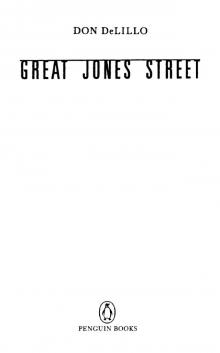 Great Jones Street (Contemporary American Fiction)
Great Jones Street (Contemporary American Fiction)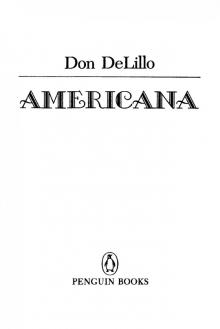 Americana
Americana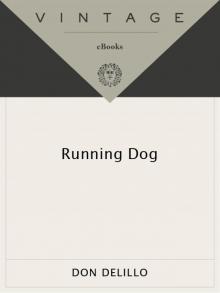 Running Dog
Running Dog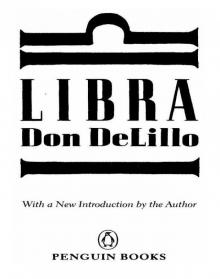 Libra
Libra End Zone
End Zone Ratner's Star
Ratner's Star Underworld
Underworld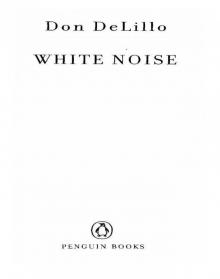 White Noise
White Noise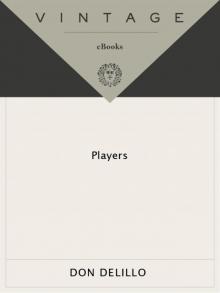 Players
Players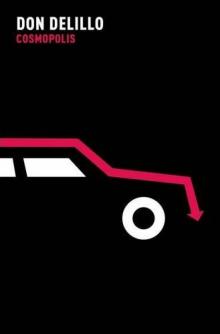 Cosmopolis
Cosmopolis The Silence
The Silence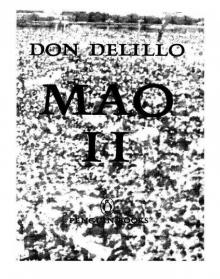 Mao II
Mao II Zero K
Zero K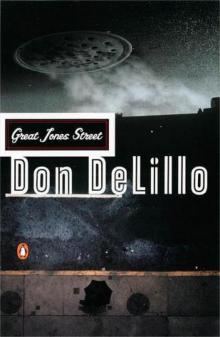 Great Jones Street
Great Jones Street The Angel Esmeralda
The Angel Esmeralda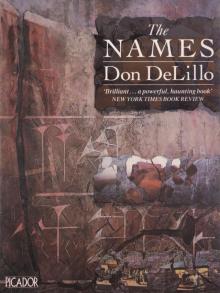 The Names
The Names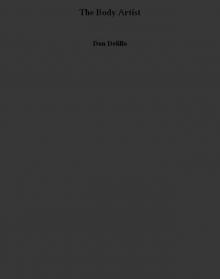 The Body Artist
The Body Artist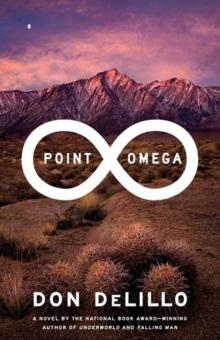 Point Omega
Point Omega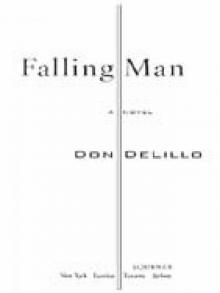 Falling Man
Falling Man